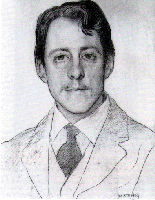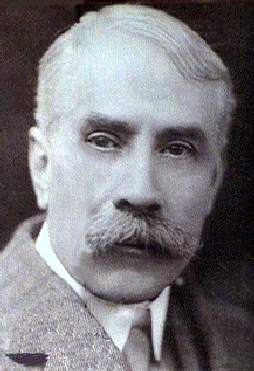|
For The Fallen
(Laurence Binyon)
With proud thanksgiving, a mother for her children,
England mourns for her dead across the sea.
Flesh
of her flesh they were, spirit of spirit,
Fallen in the cause of the free.
Solemn the drums thrill: Death august and royal
Sings sorrow up into immortal spheres.
There is music
in the midst of desolation
And a glory that shines upon our tears.
They went with songs to the battle, they were young,
Straight of limb, true of eye, steady and aglow.
They
were staunch to the end against odds uncounted,
They fell with their faces to the foe.
They shall grow not old, as we that are left grow old;
Age shall not weary them, nor the years condemn.
At
the going down of the sun and in the morning
We will remember them.
They mingle not with laughing comrades again;
They sit no more at familiar tables of home;
They have
no lot in our labour of the day-time;
They sleep beyond England's foam.
But where our desires are and our hopes profound,
Felt as a well-spring that is hidden from sight,
To
the innermost heart of their own land they are known
As the stars are known to the Night;
As the stars that shall be bright when we are dust,
Moving in marches upon the heavenly plain,
As the
stars that are starry in the time of our darkness,
To the end, to the end, they remain.
Originally published in The Times on 21 September 1914.
The Fourth Of August
(Laurence Binyon)
Now in thy splendor go before us,
Spirit of England, ardent eyed,
Enkindle this dear earth that bore us,
In the hour of peril purified
The cares we hugged drop out of vision,
Our hearts with deeper thoughts dilate.
We step from days of sour division
Into grandeur of our fate.
For us the glorious dead have striven,
They battled that we might be free.
We to their living cause are given;
We arm for men that are to be.
Among the nations nobliest chartered,
England recalls her heritage,
In her is that which is not bartered,
Which force can neither quell nor cage.
For her immortal star are burning;
With her, the hope that's never done,
The seed that's in the Spring's returning,
The very flower that seeks the sun.
She fights the fraud that feeds desire on
Lies, in lust to enslave or kill,
The barren creed of blood and iron,
Vampire of Europe's wasted will....
Endure, O Earth! and thou, awaken,
Purged by this dreadful winnowing-fan,
O wronged, untameable, unshaken
Soul of divinely suffering man.
To Women
(Laurence Binyon)
Your hearts are lifted up, your hearts
That have foreknown the utter price.
Your hearts burn upward like a flame
Of splendor and of sacrifice.
For you, you too, to a battle go,
Not with the marching drums and cheers
But in the watch of solitude
And through the boundless night of fears.
Swifter, swifter than those hawks of war,
Those threatening wings that pulse the air,
Far as the vanward ranks are set,
You are gone before them,
you are there.
And not a shot comes blind with death,
And not a stab of steel is pressed
Home, but invisibly tore
And entered first a woman's breast
Amid the thunder of the guns,
The lightning's of the lance and sword
Your hope, your dread, your throbbing pride
Your infinite passion is outpoured.
From hearts that are as one high heart
Withholding naught from doom and bale
Burningly offered up, - to bleed,
To bear, to break, but not to fail !
|
 |
|
 |
 |
|

|
| Laurence Binyon |
|
|
1869-1943
the Wikipedia biographical
entry, with appropriate links
Laurence Binyon, the noted war poet, worked in the Department of Prints and Drawings at the British
Museum. The head of department,
Sir Sidney Colvin, was a good friend of Elgar. When, late in 1914, Binyon published his collection of war poems,
The Winnowing Fan, Colvin suggested to Elgar that he should compose a war requiem which captured the spirit
of Binyon's poems.
Elgar was deeply affected by the suffering caused by the First World War and readily accepted Colvin's idea, selecting
three of Binyon's poems - The Fourth of August, To Women and For the Fallen - to
set to music.
|
|
 |
 |
 |
 |
|

|
| Sir Edward Elgar |
|
|
1857-1934
the Wikipedia biographical
entry, with appropriate links
Until recently, the first full performance of The Spirit of England was first believed to have taken place
at a Royal Choral Society concert at the Royal Albert Hall, London on 24 November 1917. However, based upon evidence
published in the November 1996 issue of the
Elgar Society Journal it was shown that Elgar himself had conducted a complete performance of the work in Leeds some three weeks earlier. However,
even this performance was preceded by a complete performance in Birmingham on 4 October 1917, conducted by Appleby Matthews,
a notable local musician who, three years later, founded the orchestra that was to become the
City of Birmingham Symphony Orchestra
|
|
 |
 |
 |
 |
| |
|
related internet links
|
|
the webpage on our
Walk Awhile literary website
based around Wilfred Owen's
poem and other related works
More than any other conflict,
the Great War inspired writers
of all generations and classes,
most notably among combatants.
|
|
 |
 |
 |
 |
|
A note:
the text for the poems
was taken from
For The Fallen
Laurence Binyon 1869-1943
published: Hodder & Stoughton,
London. 1917
28 leaves. 5 pages of colour plates.
a commemorative edition.
|
|
 |
 |
|
 |
|
|
 |
|
|
|

